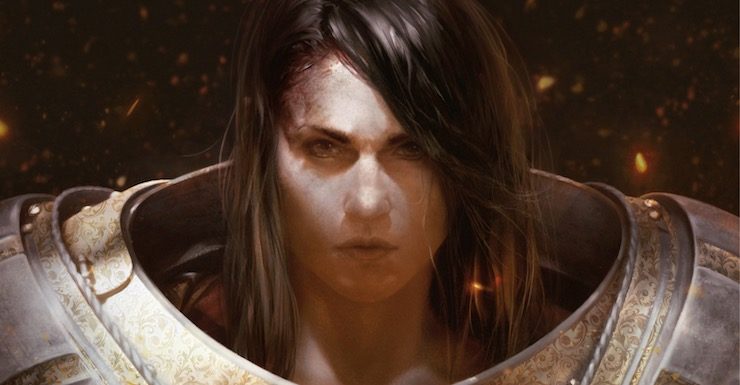For nearly two decades, Jim Killen has served as the science fiction and fantasy book buyer for Barnes & Noble. Every month on Tor.com and the B&N Sci-Fi & Fantasy Blog, Jim shares his curated list of the month’s can’t-miss new SFF releases.
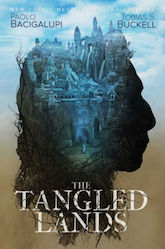 The Tangled Lands, by Paolo Bacigalupi and Tobias S. Buckell
The Tangled Lands, by Paolo Bacigalupi and Tobias S. Buckell
(February 27, Saga Press—Paperback)
Khaim is the last city left from a crumbled empire that became overreliant on magic, overusing it until it turned toxic. Magic is outlawed in Khaim both so its ruler, the Jolly Mayor, can consolidate magical power in his own hands and because the use of magic encourages the growth of bramble, a deadly vine that puts people into comas when nearby or kills instantly with a thorn-prick. Written as four novellas (two by each author; two of them previously published and two of them new), this environmentalist fantasy tells the story of a city being strangled by a polluted and misused natural resource—which doesn’t stop bad actors from trying to use it to further their own power and control. As a brilliant alchemist tries to find a way to stop bramble, a group of women warriors fight against encroaching tyranny.
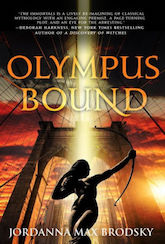 Olympus Bound, by Jordanna Max Brodsky
Olympus Bound, by Jordanna Max Brodsky
(February 13, Orbit—Hardcover)
Brodsky concludes her gods-in-Manhattan trilogy with a writhing, complex story that begins with Selene DiSilva, a.k.a. the goddess Artemis, hunting her grandfather, Saturn, and the remnants of his cult, which is still targeting Selene’s friends. If she’s going to finally stop them she will have to finally turn and face her own past. Meanwhile, her mortal lover Theo, believing her to be dead, seeks a way to bring her back. It all leads to a confrontation on Mount Olympus itself, as the surviving gods gather for the first time in centuries and Selene must truly face what it means to be an embodiment of Artemis, a goddess whose family once ruled from Olympus.
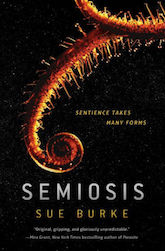 Semiosis, by Sue Burke
Semiosis, by Sue Burke
(February 6, Tor Books—Hardcover)
Sue Burke’s Day Job is in translation, and her impressive debut novel is focused on communication, telling a planetary colonization story with a twist. As the Earth nears environmental collapse, a colony ship is launched in a desperate bid to ensure humanity’s survival. The ship is forced to land on an unexpected planet, which the colonists name Pax—and which is populated by sentient plants and other life. Each chapter is told by a member of a subsequent generation of the humans, who forge a symbiotic bond with Pax’s native life. But that relationship isn’t always comforting; unlike on Earth, on Pax, humanity isn’t sitting on top of the food chain, and communicating with plants is a complex art.
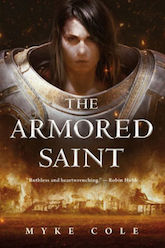 The Armored Saint, by Myke Cole
The Armored Saint, by Myke Cole
(February 20, Tor.com Publishing—Hardcover)
Heloise is a poor peasant girl with ambitions—but the world she lives in is a dangerous and unfair one in which wizards lurk in hiding, suddenly transforming into portals that allow monstrous demons to invade. Against this chaos stand pious knights who hunt and destroy the wizards—but the knights can be almost as dangerous, massacring entire villages on suspicions of wizardry, killing others for little or no reason. When Heloise and her village are forced to assist the knights in destroying their neighbors based on false charges, she rebels and sets off down a dangerous path, with demons on one side and zealots on the other.
 Battle Hymn, by William C. Dietz
Battle Hymn, by William C. Dietz
(February 20, Ace—Hardcover)
Dietz concludes his America Rising trilogy with an intense final chapter. Major Robin “Mac” Macintyre has been named a war criminal by her own father, who believes she’s responsible for the death of her sister, making life even harder for Mac’s troops as they fight a series of brutal battles and the second Civil War races towards a bloody conclusion. The New Confederacy gambles on a surprising strategy to achieve victory, and Mac and her ex-con soldiers on the Union side find themselves in the thick of it, fighting for their lives as bounty hunters swarm to collect the price on her head. Mac is ordered into Mexico to free Union POWs and capture a necessary oil field—but ultimately the cost of victory for the North might be the life of her own father, General Bo Macintyre.
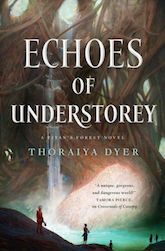 Echoes of Understorey, by Thoraiya Dyer
Echoes of Understorey, by Thoraiya Dyer
(February 13, Tor Books—Paperback)
Dyer’s sequel to Crossroads of Canopy tells the story of Imeris, who has trained rigorously to be the greatest warrior and hunter in competition with her goddess sister and her beautiful, charming brother. Smarting from the complete failure of her self-imposed mission to hunt and kill the sorceress Kirrik, Imeris goes into hiding—and then climbs the huge trees of the forest up to the sunny world of Canopy in order to learn how to finally defeat the sorceress. There she’s surprised to be recruited into a hunt for the ages chasing down a magical monster. Finally, Imeris has found a challenge that will test every bit of her strength, resolve, and ability—with absolutely no guarantee of success.
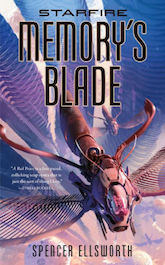 Starfire: Memory’s Blade, by Spencer Ellsworth
Starfire: Memory’s Blade, by Spencer Ellsworth
(February 20, Tor.com Publishing—Paperback)
Ellsworth’s ridiculously entertaining take on gritty space opera reaches its conclusion in the rapid-fire third installment of the Starfire trilogy, returning us to a diverse universe of giant bugs and intergalactic civil war. John Starfire has become the new ruler of the Empire, destroying lives and planets in his bid to eradicate humanity. All that stands in his way is Jaqi, once an aimless drifter, now caught up in events much larger than herself. And then there’s the matter of the massive, sun-eating spiders, who have emerged from the darkest corners of the galaxy to consume everything in their path—in the face of a threat like that, petty human and alien squabbles like war and genocide seem a bit less consequential, don’t they? If you’ve yet to start this series, you’ve no more reason to delay—snap up the complete trilogy now.
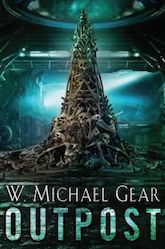 Outpost, by W. Michael Gear
Outpost, by W. Michael Gear
(February 20, DAW—Hardcover)
Donovan is a paradise planet: a perfect climate and a breathable atmosphere, rich in every resource. But it’s far away, and surviving there comes at a price. When Supervisor Kalico Aguila arrives in orbit, she finds an opportunity: Donovan is in chaos, its colonial government overthrown, the population running wild, and only a small pocket of order remaining. Kalico knows she could take control and wind up the most powerful woman in the solar system, or die trying. Planetside, Talina Perez struggles to maintain the foothold of law and order in Port Authority—but more than just a population gone wild, the planet itself has its own designs. As if that weren’t enough, a ghost ship soon arrives in orbit, the crew dead of old age, and evidence of a death ritual sending a warning to everyone. Gear is also the author, along with his wife Kathleen O’Neal Gear, of more than 50 other novels, many of them historical tales, and he brings that same sense of authenticity of place to this sci-fi thriller.
 Moonshine, by Jasmine Gower
Moonshine, by Jasmine Gower
(February 6, Angry Robot—Paperback)
Built upon dried lava beds at the foot of a massive volcano, Soot City is a twisted version of 1920s Chicago that exists in a world where magic and magical creatures are very real—and are outlawed under laws akin to Prohibition. Daisy Dell is a thoroughly modern girl who arrives in the big city with a few magical trinkets she inherited from her grandmother and a determination to make the city hers. Finding work at an underground Mana factory where the illegal magical elixir is made pays the bills—but also puts Daisy in danger. Bounty hunters start working the streets of Soot City, hunting magicians, and Daisy quickly finds herself directly in their path, forced to decide whether to hang onto her magic or play it safe.
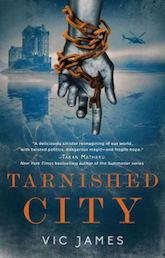 Tarnished City, by Vic James
Tarnished City, by Vic James
(February 6, Del Rey—Hardcover)
Set in an alternate England where magically-gifted Equals rule over the masses of “Skilless” with aristocratic cruelty, James’ sequel to Gilded Cage finds the rebellion against the Equals in disarray. The rebels have been framed for the assassination of Chancellor Zelston, leader of Parliament—specifically, Abi Hadley’s brother Luke. As a result, Abi and her family are forced to live in the worst of the slavetowns, Millmoor, while Luke is given into the custody of a cruel Equal who seeks to break him, physically and mentally. Abi plots to rescue her brother before he’s lost, with the unexpected help of an Equal boy who has sympathies with the rebels—but the political complexities of both the ruling class and the uprising complicate matters. James’ debut more than delivered on an ingenious premise, and this sequel only raises the stakes and widens a fascinating dystopian setting.
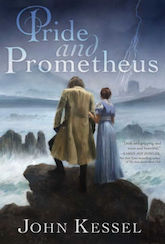 Pride and Prometheus, by John Kessel
Pride and Prometheus, by John Kessel
(February 13, Saga Press—Hardcover)
In the SFF world there are mashups, and there are mashups, and the moment you read the title of Kessel’s new novel—expanded from his award-winning novella—you know you’re in for something extraordinary. After her sisters have married well, Mary Bennett (of Pride and Prejudice fame) is bored…until she meets the haunted but handsome Victor Frankenstein at a party in London. Sucked into the plot of another novel altogether, Mary becomes a part of Frankenstein’s Monster’s plan to force the scientist to create a bride for him, a free-fall into the unimaginable Mary handles with the expected Bennett aplomb. After a decade without a new novel, Kessel wowed us with last year’s The Moon and the Other; that he has returned again so soon, and with such a different sort of book, is some kind of miracle.
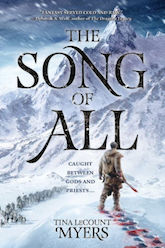 The Song of All, by Tina LeCount Myers
The Song of All, by Tina LeCount Myers
(February 20, Skyhorse Publishing—Paperback)
Inspired by indigenous Scandinavian cultures, Myers tells the story of Irjan, a legendary hunter and warrior in a arctic world where human mortals battle immortal tribes, both serving the same gods. Old and weary, Irjan breaks his oaths and walks away from endless war to be a farmer and raise a family. But the corrupt priests of his home conspire with the warriors he abandoned and use his family as a bargaining chip, forcing him back into the fray. Trying to save his son, Irjan encounters an immortal who also has given birth, and he soon finds himself safeguarding both children in a violent universe. His only path to their survival seems likely to be both bloody and brutal.
 Gunpowder Moon, by David Pedreira
Gunpowder Moon, by David Pedreira
(February 13, Harper Voyager—Paperback)
In a future in which Earth maintains mining operations on the moon amidst escalating tensions on the planet’s surface, Caden Dechert, chief of the United States’ station, manages to keep a reasonable relationship with his Chinese counterpart despite the echoing of the drums of war. But when petty sabotage and theft turns into murder, things begin to spin out of control in the unforgiving environment of the barren, airless moon. As the body count rises, Dechert must balance his desperate investigation into the crimes against his efforts to talk some sense into his superiors planetside. The title refers to the moon’s ever-present scent of gunpowder, an ill omen if there ever was one. Former journalist Pedreira gets the worldbuilding right, but it’s the suspense that truly keeps the pages turning.
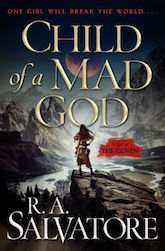 Child of a Mad God, by R.A. Salvatore
Child of a Mad God, by R.A. Salvatore
(February 6, Tor Books—Hardcover)
R.A. Salvatore, creator of the legendary elven warrior Drizzt Do’urden, returns with the first book in a completely original fantasy world. In the land of Corona, survival against the forces of nature and magic is never a given. The Usgar are a warlike tribe that prey on the less-savage settlements below their mountain homes, protected by the crystal magic practiced by the women of the tribe, a coven of witches that nevertheless lives under the heel of the warrior men. Young Aoleyn may be the strongest witch ever born to the Usgar, but she is fated, like most of the women of the tribe, to be married and brutalized. As she desperately tries to master her control over magic in order to secure her own freedom, she is targeted by the greatest—and cruelest—warrior of the tribe, and also by the demon that hunts all who wield the power of the crystals. Meanwhile, a survivor of plague and a rare outsider trader in the insular area of Corona seeks his own destiny, tracking the attacks and deprivations of the Usgar and undoubtedly moving towards deeper involvement with Aoleyn in future books.
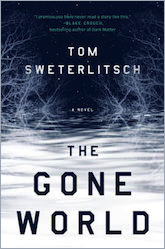 The Gone World, by Tom Sweterlitsch
The Gone World, by Tom Sweterlitsch
(February 6, Putnam—Hardcover)
In 1997, NCIS special agent Shannon Moss is tracking a missing Navy SEAL wanted for murder. Using top-secret military technology, she is able to travel back and forth in time in order to gather clues—though the futures she travels to are only possible futures, not fixed, and thus not admissible as evidence. As she gathers clues to the SEAL’s whereabouts, she notes that every possible future she visits is doomed by the same cataclysmic event—an alien intrusion known as the White Hole. Her investigations begin to center more on gathering clues as to how this cataclysm took place and to disrupt the events that will lead to it—yet through it all, she must avoid becoming trapped in one of the endless time loops known as “thin space.” Though shelved with the literary fiction, The Gone World is high concept sci-fi to the core.
 Paris Adrift, by E.J. Swift
Paris Adrift, by E.J. Swift
(February 6, Solaris—Paperback)
Seeking to escape an unhappy life in England, Hallie follows in the footsteps of many young women before her and moves to Paris. Securing a job as a bartender at expat bar Millie’s, she finds herself taken under the wing of Gabriela, who introduces her to the magical evening world around her. But then, strange things begin to happen—birds and animals offer Hallie ominous warnings, and a woman arrives at the bar claiming to be a “chronometrist,” an expert is the measurement of time. And that’s before Hallie finds a time portal in the keg room of Millie’s, and begins traveling to the Paris of the future and the past—each time losing a bit of herself in the process. Soon, her own future begins to seem less and less familiar.
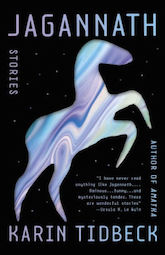 Jagannath, by Karin Tidbeck
Jagannath, by Karin Tidbeck
(February 28, Knopf—Paperback)
Originally published by Jeff and Ann Vandermeer in 2012, Tidbeck’s first English-language collection of short fiction tends towards the lush and the fertile, standing in contrast to her English-language debut Amatka, which is a surreal, paranoid story set on a barren and utterly alien colony. In the thirteen stories collected in Jaganaath, Tidbeck displays a knack for concepts simultaneously beautiful and bleak: stories that explore depression in the face of perfect love, a loneliness that drives someone to create a vegetable child, an impossible love for an airship. Tidbeck’s incredible control of language in the service of fantastic,often disturbing ideas makes it ambushes the reader in stories like “Pyret,” which begins as a traditional fantasy concept told in the form of an academic paper, then slowly transforms into something much more personal and unexpected.
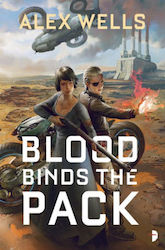 Blood Binds the Pack, by Alex Wells
Blood Binds the Pack, by Alex Wells
(February 6, Angry Robot—Paperback)
The sequel to Hunger Makes the Wolf finds Hob Ravani and the Ghost Wolves biker gang promoted from criminals to resistance fighters. Hob used her powers to pull off a spectacular train job in the first book, breaking TransRift Inc.’s hold on her part of Tanegawa’s World—but the company, having finally found the source of a strange mineral that powers their Weathermen to rifts in space and time and allowing for interstellar travel, won’t walk away from the planet that easily. War is coming, and the rebels prepare by creating a new kind of Weatherman, dubbed Mr. Yellow, that is more powerful than any previous model. The diverse and restless people of Tanegawa’s World are tired of being oppressed, and are fighting back not just through magic, violence, and resistance—but through unionization and organization. Illustrating the power of the people even against enormous odds and soulless corporations—this is SFF for 2018 for sure.
 Embers of War, by Gareth L. Powell
Embers of War, by Gareth L. Powell
(February 20, Titan Books—Paperback)
Gareth L. Powell is the mad genius behind the Ack-Ack Macaque trilogy, a British Science Fiction Award-winning saga of alt-history warfare and an uplifted monkey fighter pilot welding a machine gun. Sounds ridiculous, sure, but he managed to twist the premise in service of some really smart sci-fi, and he only tops himself in Embers of War, which turns some of our favorite space opera tropes (including sentient starships) to eleven. Trouble Dog was a vessel built for war, but after the conflict is over, the artificial mind at its core feels regret for its role int he conflict. She joins the House of Reclamation, a sort of rescue organization for trouble starships. Shortly after, she and a small human crew of miscreants are tasked with discovering what has happened to a passenger ship that has gone missing in disputed space. One of the missing ship’s passengers, Ona Sudak, is a reknowned poet, but was also living a dangerous double life, the facts of which are teased out by government intelligence officer Ashton Chide, who uncovers secrets that could plunge the galaxy into war yet again—unless Trouble Dog can figure out how to stop it.
 Ambiguity Machines and Other Stories, by Vandana Singh
Ambiguity Machines and Other Stories, by Vandana Singh
(February 20, Small Beer Press—Paperback)
Over the past few years, Small Beer Press has become a reliable source of outstanding literary-leaning speculative fiction collections, and they continue the trend in 2018 with this assembly of stories from writer and physicist Vandana Singh, who has been published in venues from Lightspeed, to Clarkesworld, to Tor.com. The wide-ranging stories found here include “Oblivion: A Journey,” an SF revenge tale steeped in Hindu mythology, and the title tale, presented in the form of an engineering exam that considers the classification of three new types of machine life. Ingenious stuff.
This post was published simultaneously on the B&N Sci-Fi and Fantasy Blog.










